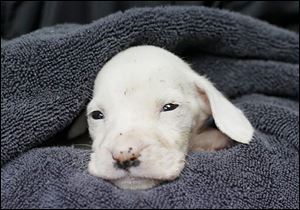
Acquiring family pets via online ads can pose dangers for animals
Check living conditions, experts say
4/6/2014
Parker, a ‘pit bull’ puppy now in the foster care of Amy Bolinger of Perrysburg, was rescued by the Lucas County Pit Crew from a horrific environment in Toledo. Parker and other puppies had been offered on Craigslist for $10 apiece.
THE BLADE/LORI KING
Buy This Image

A ‘pit bull’ puppy named Hope died shortly after she was surrendered to the Lucas County Pit Crew. Hope’s owner had acquired the gravely ill puppy through a Craigslist ad.
By the time little Hope was surrendered to the Lucas County Pit Crew, she was barely hanging on.
The tiny white “pit bull” mix puppy, estimated at 6 weeks old and weighing less than 3 pounds, was severely malnourished and dehydrated, and had a belly so full of parasites she was vomiting live worms.
She was immediately hospitalized but didn’t make it through the night.
“She was already dying when we got her, and despite the veterinarian’s best efforts, she was too far gone,” said Jean Keating, executive director of the Pit Crew.
The Toledo family that surrendered Hope had purchased her just a few days before through an ad on Craigslist, a popular classified advertisement Web site.
“She didn’t get like that in just a couple of days,” Ms. Keating said. “She was already very sick when they got her.”
Animal advocates like Ms. Keating say classified ads in online forums, in addition to ads in other media, can pose a variety of dangers for animals.
Gary Willoughby, executive director of the Toledo Area Humane Society, which is charged with investigating animal neglect and cruelty in Lucas County, said there is nothing wrong with getting an animal through a classified ad. “Adoption from a rescue is always fantastic, but if you want a specific breed of animal, sometimes the easiest and quickest way to do that is through an ad,” he said.

Keating
While there may be reputable breeders who use the classifieds, there are also people who are commonly called “backyard breeders” in animal-welfare circles. These individuals breed animals with little knowledge of good husbandry practices. They may not provide veterinary care for their animals, and many are simply looking to make a few bucks.
Craigslist, which did not respond to a request for comment from The Blade, provides users a way to flag problem ads for removal and cooperates with law enforcement for subpoenas and search warrants for records, according to its Web site.
At The Blade, advertising representatives follow company guidelines suggesting that animals advertised in the paper be at least 8 weeks old and that the ad include an asking price to help deter individuals who may seek free animals for undesirable reasons.
“We cannot make someone follow these guidelines but highly suggest that they do,” said Jim Williams, retail advertising manager for The Blade. “I have been told that we have turned ads away in the past if we felt the seller was up to no good.”
Mr. Willoughby said some owners advertise their animals because they are unaware of other options, area shelters are full, or they fear the animals will be put down if surrendered to county dog wardens or rescue groups.
“Rescues can’t always take everybody’s animals, so you may have to come up with your own method to rehome animals,” said Nikki Morey, executive director of Planned Pethood. “One of those ways is through ads.”
Former owners
Some rescue organizations have strict adoption qualifications that limit who can adopt from them. That was the case for Toledo resident Alyssa Kihara, who got her flat-coated retriever, Milo, off Craigslist three years ago when she lived in Tennessee near Fort Campbell, an Army post.
“The one shelter in town was really specific about coming and doing home visits and having a fenced yard,” she said. “We didn’t have a fenced yard, so we couldn’t get a dog from them.”
Milo’s original owner had been a military man who had to place his dog with a friend when he was deployed. That friend’s children then developed allergies, leading to the ad on Craigslist.
Ms. Kihara visited Milo and saw that his living conditions were mostly normal. Milo did not have any veterinary records and needed a deworming but was otherwise healthy.
While Milo’s former owners appeared to have done their best for him, Hope’s former owner had not.
“She had never been dewormed. Had she truly been treated early on, she would have been fine,” Ms. Keating said.

Parker, a ‘pit bull’ puppy now in the foster care of Amy Bolinger of Perrysburg, was rescued by the Lucas County Pit Crew from a horrific environment in Toledo. Parker and other puppies had been offered on Craigslist for $10 apiece.
Hope was originally listed in early December with her seven siblings, and the pups appeared healthy in their photos, Ms. Keating said.
The family that purchased Hope met the seller in a parking lot for the transaction at the end of December. They did not see the parents or the dogs’ living conditions. Other than a nickname, the seller did not provide information about himself. He also did not inquire about the family’s ability to care for Hope.
“When people really don’t seem to want to have a relationship with you, that’s a big red flag,” Ms. Keating said.
The Pit Crew attempted on several occasions to rescue Hope’s remaining siblings. A volunteer got in touch with the seller, but the man soon ceased all communications. He later reached out via the Pit Crew’s Facebook page about surrendering two of the remaining pups but never followed through.
Rescue efforts
The “pit bull” rescue has four puppies rescued from classified ads in its program currently. Parker, a 3-month-old brindle and white pup, and his look-alike brother Preston were picked up by a volunteer a few weeks ago from a horrific living environment on Jarvis Street in Toledo.
“The first thing I saw was the cockroaches,” said Angela Schultz, a Pit Crew volunteer.
She said the house was full of garbage, dirty dishes, and feces from the animals. Used needles and burned spoons, indicating the pups’ owner was possibly a heroin addict, were strewn everywhere.
Ms Schultz had seen an ad for the pups and their siblings on Craigslist for $10 apiece. Within an hour of the ad being posted, all the females in the group had been picked up by others.
“He just wanted the money,” Ms. Schultz said. “I just gave him the $20 and got those two out of there. He had no idea I was with a rescue group.”
She set Preston and Parker on the grass outside and they “pancaked,” crouching flat to the ground in terror. They did the same inside her house, sticking close to each other. Ms. Schultz said Parker was very hand shy, which is often an indication of abuse.
“For a puppy to be like that is really unusual,” Ms. Keating said. “You’d just reach toward him and he’d squish right down in fright.”
The puppies had a full worm load, and Parker was treated for the possible beginning of demodectic mange. Both pups quickly recovered, and Preston was adopted last week.
Getting details
Mr. Willoughby said people looking to get a pet from an ad should ask to see the animal’s living conditions and parents.
Getting veterinary records, meeting the animal, and introducing it to everyone — human and animal — in the household before completing the transaction are critical.
Toledo resident Ashley Wagener took in a 1-year-old “pit bull” named Mocha after her niece had purchased the dog off Craigslist and it became aggressive. Ms. Wagener turned to Craigslist to find a new home for the dog.
Ms. Wagener had mentioned Mocha’s aggression in her ad, saying she needed to go to a home with no other animals or children, and did not ask for a fee. That resulted in intense interest from people who Ms. Wagener suspected were looking to use Mocha for dog fighting or other unsavory activities. One woman began harassing her with phone calls.
“We changed it to add a rehoming fee, and that stopped a lot of the calls,” Ms. Wagener said.
After about six weeks, Ms. Wagener found Mocha a new home with a Perrysburg woman who asked appropriate questions about the dog and met her in person.

Willoughby
“They meshed very well, and [Mocha] is doing really well now. We get updates on her,” Ms. Wagener said.
Mr. Willoughby said if an individual is selling or seeking a new home for an animal through classified ads, that person needs to take responsibility for checking out applicants.
He noted that free animals are often sought after by people who may want to use them as fighting dogs or as bait animals. Other people seek to collect free animals to immediately resell them to make money or, sometimes, to torture and kill them.
“A rehoming fee can help weed some of that out,” Mr. Willoughby said. “That money could be turned over as a donation to a local shelter if you want.”
Red flags
Some area animal lovers and rescue groups have begun checking classified advertisements for possible trouble.
Red flags can be found in the background of photos, like feces or garbage littering the floor, or the animal in the picture may be bony or have a swollen stomach. A lack of specific information in the text of the ad could also be a clue.
Planned Pethood has a program called Litter Patrol, started in 1998, in which volunteers search the classifieds for litters of puppies and kittens. The group will then get in touch with the advertiser and offer to take the animals if space is available. When funding is available, the group also will try to provide spay/neuter surgeries for all animals in the household to prevent future problems.
“Even if we don’t have funding, we’re still calling them and educating them about the options available to them,” Ms. Morey said.
Most of the people the group connects with are trying to find homes for an unintentional litter, though they occasionally find backyard breeders as well.
Karen Latta, cat coordinator for Planned Pethood, has taken to posting ads for the rescue group on Craigslist, offering to take cats and kittens and to offer spay/neuter help. A few people have reached out and gotten help, such as a woman last week who surrendered two litters of kittens and received help getting her two adult female cats spayed.
Mr. Willoughby said the number of calls to the humane society asking the agency to investigate cases from classified ads has risen slightly in recent years, “probably partially as over time more people are listing animals on the Internet than they were a decade ago and also because more animal lovers are looking on these sites and they take the time to share their findings with us.”
Investigating such cases can be difficult, Mr. Willoughby said.
People can remain nearly anonymous and may be using fake names. Without at least an accurate address, an investigation becomes nearly impossible.
“If we know where the person lives, we can do a general animal-welfare check and see what we find,” he said.
Trying to pose as buyers and setting up meetings with sellers can also be difficult for the humane society.
“If we get volunteers who are willing to help us do that, that makes things easier,” he said.
Mr. Willoughby said the humane society is examining potential options to deal with the issue of animals in classified ads, including forming partnerships with other area organizations like the Pit Crew and Planned Pethood.
“It’s something people are taking notice of and that they care about,” Mr. Willoughby said. “It may not happen too often now, but we want to be able to respond appropriately and ensure the animals’ well-being as technology changes the way things are done.”
Contact Alexandra Mester: amester@theblade.com, 419-724-6066, or on Twitter @AlexMesterBlade.